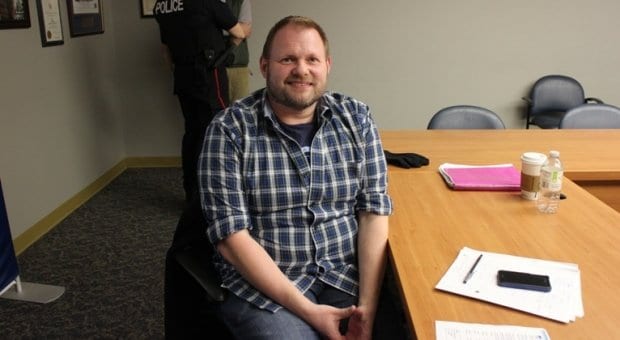There are times when the Ottawa Police Service’s GLBT liaison committee meetings are downright cozy.
In sharp contrast to minus-zero temperatures outside, the meeting room on the second floor of the OPS headquarters on Elgin Street is warm. Bottled water, soft drinks, sandwiches and cookies are provided. The chairs are comfortable.
But going to the police station is still something many people aren’t comfortable doing. Take the youth who participated at the round table discussion at Ottawa City Hall on Nov 23. The young leaders were passionate about sharing their views but chose not to attend the Feb 24 liaison meeting, says Gary Leger, the community co-chair.
“I don’t think it’s a setback, and I don’t find it disappointing,” Leger says. “I think it’s just another step that we need to take to make sure [youth involvement] gets developed.”
The liaison committee held the Nov 23 roundtable to determine why more youth don’t join the committee — and how better to reach out to them. The event covered off a wide range of topics, from a general fear of police to the perception that violence against LGBT people isn’t taken seriously.
The resulting list of recommendations is an excellent starting point, Leger says.
Constable Walter Duhme, from the diversity and race relations unit, suggested OPS’s youth advisory committee (YAC) could make a presentation to the liaison committee. Once the committee has a better idea of how police are already engaging youth, the committee could then look at creating a subcommittee to reach more youth and set up meetings in the community rather than at OPS headquarters, Leger says.
The liaison committee also discussed a community member’s report of being approached on Rideau Street around 5am on Feb 16 by a person repeatedly yelling “faggot.” The same person had emailed the liaison committee on Aug 18 to report that, while walking home from an Elgin Street bar, people yelled slurs from a car, following him from light to light.
“There’s many, many reasons why people don’t report,” Leger says. “I’m hoping we can kind of break those barriers down and actually get people to report.”
Even if an incident doesn’t result in charges, it’s always better to report because it can be used in sentencing at a future date to establish a pattern of hate, Duhme says.
Because of short-staffing in the summer, no one responded to the community member’s Aug 18 email until Sept 16. In the future, Leger says, all emails will be answered within 48 hours and he’d also like an automatic message sent reminding people that it’s an enquiry account and incidents must be reported via phone or in person.
The new police co-chair, who will replace Joan McKenna, hasn’t been named yet, but Leger says he hopes that will be rectified by the next meeting.
The GLBT liaison committee’s next meeting is March 24, 5:35pm, at OPS headquarters, 474 Elgin St.


 Why you can trust Xtra
Why you can trust Xtra


